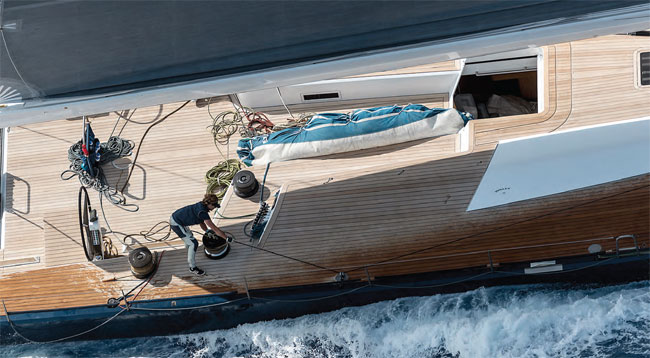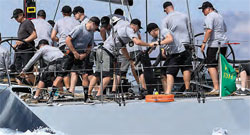

There is an old saying that what you think is the light at the end of the tunnel may be the light on the front of the approaching train and that is very much where we are with the Sars-2 corona virus and the disease it causes – Covid-19. My apologies that this column will be about medicine as well as sailing, but as many of you know that was my professional career.
As I am writing this we at the International Maxi Association and our partners at the Yacht Club Costa Smeralda have just agreed to go ahead with our flagship event, the Maxi Yacht Rolex Cup. Sadly it will be a very different event from usual. While it is always an amazing race week – and with luck that part will continue – it has also been a marvellous social and networking event for all the great and the good (and bad!) in international yacht racing.
With social distancing and all the other precautions required on land and sea, in 2020 that aspect will be very much reduced – holding few, if any, of the usual social events will not be feasible.
With the rules as they are now it will also be difficult to bring teams from quite a number of non-EU countries into the EU at all. Nevertheless, as joint organising authority we feel it is important to host the event, if only because a fundamental philosophy of our sport is not to give up until the finish; although sometimes adverse conditions force us to stay in port.
We are supported by the immense enthusiasm from owners to get back racing and, not without understandable self-interest, from the professional crews who have seen a catastrophic drop in employment opportunities since the pandemic appeared. It is very encouraging that at last count 30 Maxi owners are aiming to participate in the event, despite all the difficulties.
I have tried to be as optimistic as possible and, compared with a couple of months ago, things are greatly improved in Europe at least. I really did not want to write a column at all then, as I felt it would be so depressing. At that time I could not see that any significant international regattas would be held in 2020. Fingers crossed I will be proved wrong.
How can we make racing possible and safer in a world that has to learn to live with the virus? Yacht racing is a sport full of hazard and we intuitively make risk assessments all the time. Should we go out in heavier weather, will our equipment stand up to it, do we have an adequate number of competent and experienced crew for the conditions, not just to sail the boat, but to race? All these judgements are made by owners and captains every time they take a boat to sea. We can never know all the answers, we learn to balance risks. It is a fundamental as expressed in Rule 4 of the Racing Rules of Sailing:
Decision to race
The responsibility for a boat’s decision to participate in a race or to continue racing is hers alone. Thus I was more than astonished by the guidelines issued by the World Sailing Medical Commission to the extent that I co-ordinated a request for revision from many of the leading organisations running offshore racing – including the RORC, the ORC and JOG. The initial and the revised versions are still remarkably proscriptive and in effect transfer a lot of the responsibility for appropriate risk assessment from the boat owner to the organising authority. This I regard as a fundamental and unwelcome change, as a boat owner as well as a race organiser.
Furthermore, the guidelines set themselves the enormous – impossible – task of covering all forms of offshore racing anywhere. This at a time when the virus situation in many countries is extremely fluid with some apparently in control, others completely out of it.

My main criticism was the wish to prohibit those over 65 years of age (even younger if they have conditions such as diabetes) from racing at all. Here there appears to have been confusion between the risks after you have caught Covid with the risk of catching it, which are two entirely different things. There has now been a revision on World Sailing’s original stipulation which stated: ‘Age limitation. Internationally, the age taken as the threshold for social distancing, to reduce the risk of contracting Covid-19, varies between 60 and 70 years old. For Category 3 and 4 races it is reasonable to follow national guidelines for social distancing as the age limit for races…’
This makes little or no sense at all for most countries. It seems to have confused ‘social distancing’ and ‘social isolation’. For the majority of countries social distancing is expressed as a distance in metres or feet with no relationship to age.
The next World Sailing proscription with which I took issue was the edict that organisers should decide if a boat is suitable for sailing with a reduced crew. Undoubtedly in the Maxi world only owners and captains of vessels can have any idea about this. Many modern Maxis have extremely efficient powered systems such that they can be sailed effectively by very few people. But the way these are planned, designed and used are very specific to different vessels and no organiser would ever be able to pronounce on this.
Proactive
For some of our events we have been trialling a system with IRC where a different TCC is given for a crew reduced by 30 per cent – much as a different TCC can be given for double-handed or no spinnaker usage. This year in Sardinia we plan to extend that to an option to reduce crew by 50 per cent in certain categories. To be able to race with 15 crew instead of 30 at a rating corrected for this might just make the difference for some owners. Certainly we will learn from this and possibly find some longterm gains.
At the time of writing in the UK we are now allowed up to six people who are not of the same household to meet and interact with social distancing. On boats in fresh air, wind and sun this should be feasible and safe in boats of adequate size. With Maxis we have the advantage of a lot more space, allowing for distancing – but also more crew which each entrant should be able to calculate. Taking spinnakers out of the equation or using snuffers and furlers should again reduce crew requirement.
However, offshore racing that includes overnights, with multiple crew sleeping below, is raising the infective risk level significantly.
Bringing crew from areas of the world with different levels of infection, different quarantine requirements, both on arrival and return, all adds considerable logistic demands on competitors. Racing across national boundaries provides more potential problems as each country is handling things differently.
Although in Europe the trend has been very encouraging, there have been a number of localised flare-ups. Without doubt the biggest risk to any of the proposed regattas will be such flare-ups where it will be highly likely that local governments will intervene and re-impose lockdown, forcing the cancellation of events. Right now some countries such as South Korea, Australia and most of all New Zealand have been successful at close containment. The problem will be how long they can remain isolated from the rest of the world where there is little or no control. It is also conceivable that countries that have suffered high rates of infection will end up better in the long run with the much misunderstood ‘herd immunity’.
Will there be a second wave this coming winter? Much of this theorising is based on the behaviour of influenza pandemics and this virus is undoubtedly very different. The truth is right now nobody knows – pronouncements from epidemiologists and economists have equivalence… they are no better than crystal ball gazers.
We just have to hope that we can get our European events off OK in September and October. Unfortunately a big question mark hangs over transatlantic races and the 2021 Caribbean season. It still remains virtually impossible for owners to plan that sort of seasonal expedition with the present level of uncertainty. The great hope is for a vaccine that will be effective, but that is very unlikely to come in time to make such plans.
To try to end on a more optimistic note: all pandemics in the past have ended. The signs for more rapid economic recovery are appearing. I remain convinced that we will eventually get back to normal sailing and racing. I am not yet willing to say when!
Andrew McIrvine MBBS FRCS, International Maxi Association secretary general
Click here for more information on the International Maxi Association »
We invite you to read on and find out for yourself why Seahorse is the most highly-rated source in the world for anyone who is serious about their racing.
To read on simply SIGN up NOW
Take advantage of our very best subscription offer or order a single copy of this issue of Seahorse.
Online at:
www.seahorse.co.uk/shop and use the code TECH20
Or for iPad simply download the Seahorse App at the iTunes store


